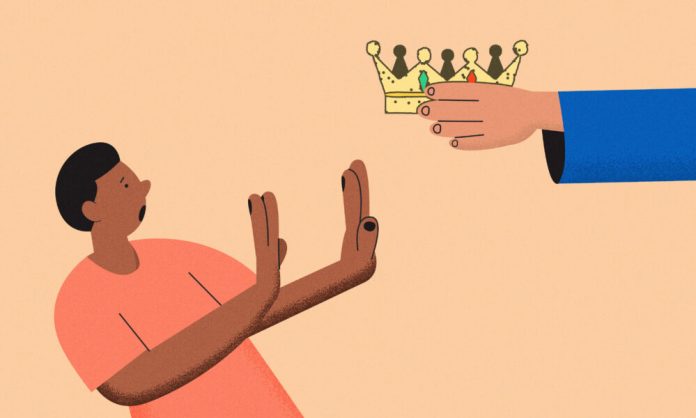“Your braids, they are totally giving. I like them. They look so beautiful.” “These braids? Really? They’re old. I’m taking them down soon.”
“Dope work with that presentation. You aced it big time, just like a true star you are, well done!” “Waah, I don’t think so, Oh mehn, did you see how nervous I was on slide number 4?”
“That’s a lovely pair of kicks (an urban way of referring to ‘shoes’) you’ve got.” “Nah I doubt, man.”
“That’s a nice and neat haircut you’ve got, my G, you look fresh!” “Guy, nah, man, tonsudiya. (loosely translating to ‘flatter me not’), I’m even balding.”
Notice what all the above statements have in common? The subtle art of quickly rejecting compliments. the quickness to deflect when someone says lovely things about us, discounting or downplaying them instead of simply accepting them. Oftentimes, it comes in the form of an inward cringe, a little frown on the face, a shrug that seems to quickly dust the compliment away, an awkward smile, etc. We might find ourselves looking away, distracted, and wishing to move on as fast as possible. We’ll do all we can to discount the compliments, rather than own it.
Read Also: “I am a FAKE”. Imposter Syndrome and how to counter it.
If this sounds very familiar to you, you are not alone. According to a survey by JD Williams, using a sample space of 2000 people, 45% of them admitted to rejecting a compliment. This will get one then wondering, Why do people downplay compliments?
Just like water to a thirsty soul, a simple compliment can make someone’s day and lift their spirits. Scientists have discovered that receiving a compliment activates the same parts of your brain that get activated when you receive a monetary reward. Another research found that compliments serve as a great source of motivation, as people tend to perform better after receiving them. It also showed that compliments and praises can significantly aid in learning new motor skills and behaviours. There’s no denying that compliments make us feel good. So why then do we downplay it?
The answer? Low self-esteem.
A study in the Journal of Experimental Social Psychology found that people with low self-esteem have difficulty accepting compliments because their negative self-theories conflict with the positive information conveyed in compliments, leading them to devalue or dismiss the positive implications of the compliments received.
So when someone compliments you on your recent call to the bar or something as simple as the nice scarf you’re wearing, something turns within you, making you squirm, and your first instinct is to hide, shrink, and ultimately downplay the compliment. If we’re keeping it a buck, that’s hardly a pleasant way to live.
So How Must We Outrightly Receive Compliments?
Start with gratitude: Avoid making excuses, ifs, or ands. If the inclination is to downplay the compliment and quickly shift the conversation, resist that urge. Instead, express gratitude by saying thank you and continue with the flow. This approach has multiple benefits – you acknowledge the compliment, fostering positive self-esteem, and you show appreciation to the person giving the compliment, enhancing their experience. Additionally, you allow yourself to fully embrace the moment. Practicing this simple act of gratitude is the initial stride towards developing comfort in accepting compliments over time.
“Your braids, they are totally giving. I like them. They look so beautiful.” “Oh! Thank you so much. I like them as well.”
Compliment back: Mastering the art of accepting compliments is as valuable as mastering the skill of giving them. After conveying your appreciation, consider extending the positivity by offering a compliment in return. Individuals adept at complimenting others often possess a keen awareness of and appreciation for the positive aspects in their surroundings. This practice not only trains your mind to focus on the positive but also helps alleviate any potential discomfort associated with receiving compliments. Additionally, when you receive praise for collaborative efforts, acknowledging teamwork and sharing credit further facilitates the process of accepting compliments with grace.
“You had the best grades this semester, you should be proud of yourself.” “Thanks a lot, buddy. Thank you for all the encouragement too.”
Consider compliments as valuable data – a form of meaningful feedback: Few things rival the gratification of dedicating yourself to a project, only to hear your boss acknowledge your efforts with a ‘well done’ or ‘good job.’ This feedback serves as a valuable gauge of the worth of your work and can guide your future endeavours. Seize the opportunity to establish a feedback loop by seeking additional details about what aspects were particularly appreciated. Whether it was your insightful suggestions or adept handling of questions during a presentation, delving into specifics not only provides insight into your strengths but also motivates you to persist in actions that garner praise. ““Dope work with that presentation. You aced it big time, just like a true star you are, well done!” your response should rather be; “Thank you so much. Coming from you, that means a lot. What aspect did you find interesting? Was it slide number 4?”
So, when next your friend tells you your pilau is the best they’ve eaten, don’t respond with, “I think it would have done better with more salt or less spices.” Simply Say thank you and be gracious about it. And when your partner tells you you are the best thing after sliced bread that has happened to them, don’t you dare shrug it off!
Written with context from Bella Naija













